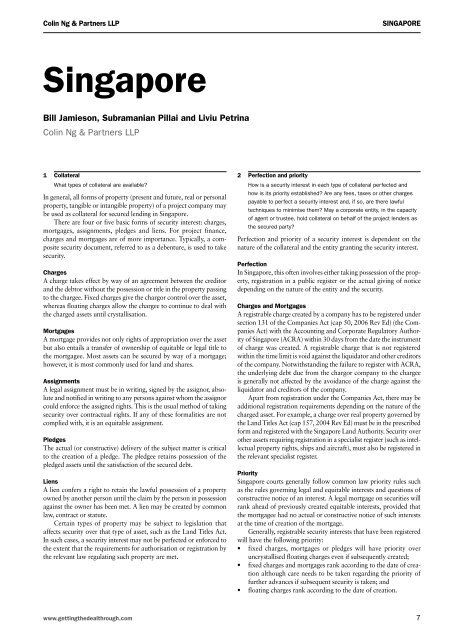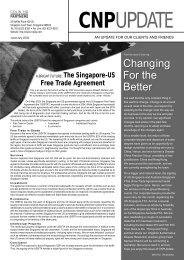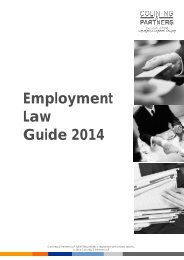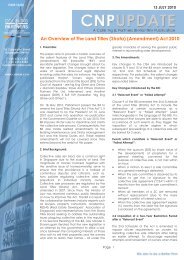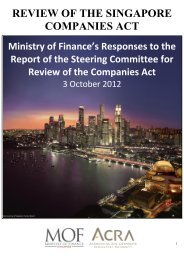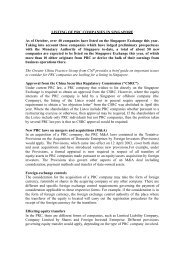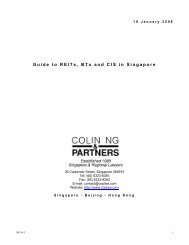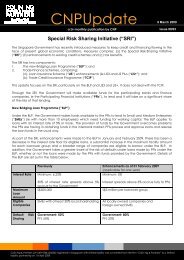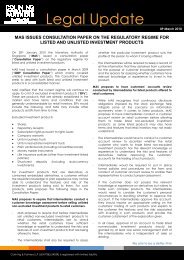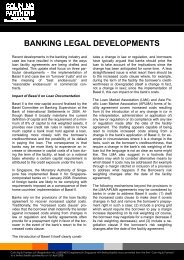Singapore - Colin Ng and Partners
Singapore - Colin Ng and Partners
Singapore - Colin Ng and Partners
- No tags were found...
You also want an ePaper? Increase the reach of your titles
YUMPU automatically turns print PDFs into web optimized ePapers that Google loves.
<strong>Colin</strong> <strong>Ng</strong> & <strong>Partners</strong> LLP<br />
<strong>Singapore</strong><br />
<strong>Singapore</strong><br />
Bill Jamieson, Subramanian Pillai <strong>and</strong> Liviu Petrina<br />
<strong>Colin</strong> <strong>Ng</strong> & <strong>Partners</strong> LLP<br />
1 Collateral<br />
What types of collateral are available<br />
In general, all forms of property (present <strong>and</strong> future, real or personal<br />
property, tangible or intangible property) of a project company may<br />
be used as collateral for secured lending in <strong>Singapore</strong>.<br />
There are four or five basic forms of security interest: charges,<br />
mortgages, assignments, pledges <strong>and</strong> liens. For project finance,<br />
charges <strong>and</strong> mortgages are of more importance. Typically, a composite<br />
security document, referred to as a debenture, is used to take<br />
security.<br />
Charges<br />
A charge takes effect by way of an agreement between the creditor<br />
<strong>and</strong> the debtor without the possession or title in the property passing<br />
to the chargee. Fixed charges give the chargor control over the asset,<br />
whereas floating charges allow the chargee to continue to deal with<br />
the charged assets until crystallisation.<br />
Mortgages<br />
A mortgage provides not only rights of appropriation over the asset<br />
but also entails a transfer of ownership of equitable or legal title to<br />
the mortgagee. Most assets can be secured by way of a mortgage;<br />
however, it is most commonly used for l<strong>and</strong> <strong>and</strong> shares.<br />
Assignments<br />
A legal assignment must be in writing, signed by the assignor, absolute<br />
<strong>and</strong> notified in writing to any persons against whom the assignor<br />
could enforce the assigned rights. This is the usual method of taking<br />
security over contractual rights. If any of these formalities are not<br />
complied with, it is an equitable assignment.<br />
Pledges<br />
The actual (or constructive) delivery of the subject matter is critical<br />
to the creation of a pledge. The pledgee retains possession of the<br />
pledged assets until the satisfaction of the secured debt.<br />
Liens<br />
A lien confers a right to retain the lawful possession of a property<br />
owned by another person until the claim by the person in possession<br />
against the owner has been met. A lien may be created by common<br />
law, contract or statute.<br />
Certain types of property may be subject to legislation that<br />
affects security over that type of asset, such as the L<strong>and</strong> Titles Act.<br />
In such cases, a security interest may not be perfected or enforced to<br />
the extent that the requirements for authorisation or registration by<br />
the relevant law regulating such property are met.<br />
2 Perfection <strong>and</strong> priority<br />
How is a security interest in each type of collateral perfected <strong>and</strong><br />
how is its priority established Are any fees, taxes or other charges<br />
payable to perfect a security interest <strong>and</strong>, if so, are there lawful<br />
techniques to minimise them May a corporate entity, in the capacity<br />
of agent or trustee, hold collateral on behalf of the project lenders as<br />
the secured party<br />
Perfection <strong>and</strong> priority of a security interest is dependent on the<br />
nature of the collateral <strong>and</strong> the entity granting the security interest.<br />
Perfection<br />
In <strong>Singapore</strong>, this often involves either taking possession of the property,<br />
registration in a public register or the actual giving of notice<br />
depending on the nature of the entity <strong>and</strong> the security.<br />
Charges <strong>and</strong> Mortgages<br />
A registrable charge created by a company has to be registered under<br />
section 131 of the Companies Act (cap 50, 2006 Rev Ed) (the Companies<br />
Act) with the Accounting <strong>and</strong> Corporate Regulatory Authority<br />
of <strong>Singapore</strong> (ACRA) within 30 days from the date the instrument<br />
of charge was created. A registrable charge that is not registered<br />
within the time limit is void against the liquidator <strong>and</strong> other creditors<br />
of the company. Notwithst<strong>and</strong>ing the failure to register with ACRA,<br />
the underlying debt due from the chargor company to the chargee<br />
is generally not affected by the avoidance of the charge against the<br />
liquidator <strong>and</strong> creditors of the company.<br />
Apart from registration under the Companies Act, there may be<br />
additional registration requirements depending on the nature of the<br />
charged asset. For example, a charge over real property governed by<br />
the L<strong>and</strong> Titles Act (cap 157, 2004 Rev Ed) must be in the prescribed<br />
form <strong>and</strong> registered with the <strong>Singapore</strong> L<strong>and</strong> Authority. Security over<br />
other assets requiring registration in a specialist register (such as intellectual<br />
property rights, ships <strong>and</strong> aircraft), must also be registered in<br />
the relevant specialist register.<br />
Priority<br />
<strong>Singapore</strong> courts generally follow common law priority rules such<br />
as the rules governing legal <strong>and</strong> equitable interests <strong>and</strong> questions of<br />
constructive notice of an interest. A legal mortgage on securities will<br />
rank ahead of previously created equitable interests, provided that<br />
the mortgagee had no actual or constructive notice of such interests<br />
at the time of creation of the mortgage.<br />
Generally, registrable security interests that have been registered<br />
will have the following priority:<br />
• fixed charges, mortgages or pledges will have priority over<br />
uncrystallised floating charges even if subsequently created;<br />
• fixed charges <strong>and</strong> mortgages rank according to the date of creation<br />
although care needs to be taken regarding the priority of<br />
further advances if subsequent security is taken; <strong>and</strong><br />
• floating charges rank according to the date of creation.<br />
www.gettingthedealthrough.com
<strong>Singapore</strong><br />
<strong>Colin</strong> <strong>Ng</strong> & <strong>Partners</strong> LLP<br />
Creditors often enter into subordination arrangements in order to<br />
contractually modify the priority position that the law confers on<br />
them.<br />
No taxes are payable to perfect a security interest, although security<br />
over assets which attract stamp duty (eg, l<strong>and</strong> <strong>and</strong> shares) is<br />
chargeable up to a maximum of S$500. A person can hold security<br />
as trustee on behalf of the project lenders as secured parties. On the<br />
insolvency of the trustee the collateral would not form part of the<br />
estate as beneficial ownership would remain with the project lenders.<br />
The concept of parallel debt is not required in <strong>Singapore</strong> as trusts are<br />
recognised in <strong>Singapore</strong> law.<br />
3 Existing liens<br />
How can a creditor assure itself as to the absence of liens with priority<br />
to the creditor’s lien<br />
For securities that need registration for perfection a search may be<br />
conducted at the relevant registries. Many security interests should<br />
be registrable charges at ACRA. These registers can be searched by<br />
any person.<br />
There are, however, some security interests that are not registrable.<br />
In such cases, one may consider taking possession of the secured<br />
property, giving notice to <strong>and</strong> obtaining acknowledgment from the<br />
applicable third party or taking warranties from the security provider<br />
to help establish that there is no existing security interest. Where<br />
charges are perfected by the transfer or endorsement of a title, it<br />
will be easier to identify a creditor that seeks to take security on that<br />
same asset.<br />
4 Enforcement of collateral<br />
Outside the context of a bankruptcy proceeding, what steps should a<br />
project lender take to enforce its rights as a secured party over the<br />
collateral<br />
The lender may choose to exercise its power to sell the property. This<br />
power should normally be provided for in any well-drafted security<br />
document. It may also be implied by statute. If the objective is to<br />
protect the security <strong>and</strong> to collect profits yielded by the property<br />
which may be applied towards discharging the debt, a receiver may<br />
be appointed either pursuant to the provisions of the security document,<br />
statute, or a court order.<br />
In enforcing the power of sale, the chargee has a duty to take<br />
reasonable steps to obtain a proper price, such as holding a public<br />
auction where appropriate. The chargee must inform itself of the<br />
value <strong>and</strong> the price obtainable for the security before it agrees to sell<br />
it to a buyer. When that is established, then the enquiry moves to<br />
determine whether the price actually obtained is a reasonable price<br />
in the circumstances. The onus is on the chargee to show that the<br />
security was properly sold.<br />
The principal procedure of enforcing a floating charge is through<br />
the appointment of a receiver <strong>and</strong> manager. The receiver <strong>and</strong> manager<br />
is appointed by the security holder by virtue of a private power<br />
of appointment in the terms of the security to be an agent of the<br />
company for the purposes of realising the security. The receiver <strong>and</strong><br />
manager’s duty is to realise the security for the benefit of the security<br />
holder, <strong>and</strong> he owes only limited duties to the company <strong>and</strong> its other<br />
creditors. The receiver <strong>and</strong> manager has the advantage of disregarding<br />
any unsecured contractual rights other parties may have against<br />
the company, yet, in his capacity as an agent of the company, he is<br />
able to enforce the company’s rights.<br />
A holder of a floating charge has the statutory power to block a<br />
judicial management order, unless there are considerations of public<br />
interest. Under these provisions, the courts are obliged to dismiss<br />
an application for a judicial management order if the making of the<br />
order is opposed by a holder secured by a floating charge.<br />
5 Bankruptcy proceeding<br />
How does a bankruptcy proceeding in respect of the project company<br />
affect the ability of a project lender to enforce its rights as a secured<br />
party over the collateral Are there any preference periods, clawback<br />
rights or other preferential creditors’ rights (eg, tax debts, employees’<br />
claims) with respect to the collateral What entities are excluded from<br />
bankruptcy proceedings <strong>and</strong> what legislation applies to them What<br />
processes other than court proceedings are available to seize the<br />
assets of the project company in an enforcement<br />
Under the pari passu principle, creditors in an insolvency in <strong>Singapore</strong><br />
that are similarly situated are treated equally in the distribution<br />
of the assets of an insolvent company. The few exceptions to this<br />
principle include, among others, proprietary securities (ie, mortgage<br />
<strong>and</strong> charge) or possessory securities (ie, pledge <strong>and</strong> lien), <strong>and</strong> the use<br />
of quasi-security devices such as retention of title or the right of set<br />
off (under section 88 of the Bankruptcy Act, cap 88).<br />
Under section 329 of the Companies Act read with section 99 of<br />
the Bankruptcy Act (cap 20 of <strong>Singapore</strong>) a transfer of property or<br />
other act relating to property amounts to an undue preference if a<br />
creditor is put in a position that, on a company’s insolvency, is better<br />
than the position he would have been in, <strong>and</strong> the company was<br />
influenced by a desire to achieve that effect. An undue preference<br />
may be challenged if it was made six months before the application<br />
or commencement of winding up of the company (or in the case<br />
where the transaction is with an associate, two years).<br />
Under section 329 of the Companies Act read with section 98<br />
of the Bankruptcy Act an undervalue transaction is a transaction<br />
entered into for a consideration which, in money or money’s worth,<br />
is significantly less than the value, in money or money’s worth of<br />
the consideration provided by a company. Such a transaction may<br />
be challenged if it was made five years before the making of the<br />
application or the commencement of winding up <strong>and</strong> the company<br />
was insolvent at the time or becomes insolvent as a consequence of<br />
the transaction.<br />
Where a floating charge has been created within six months of<br />
the commencement of the winding-up of a company, the floating<br />
charge is void unless there is proof that the company was solvent at<br />
the time the floating charge was created, under section 330 of the<br />
Companies Act. The exception to this is the amount of any cash paid<br />
to the company at the time of or subsequently to the creation of <strong>and</strong><br />
in consideration of the floating charge together with interest on that<br />
amount at the prescribed rate.<br />
Where a company is wound up (under section 328(5) of the<br />
Companies Act) or where a receiver is appointed on behalf of the<br />
holders of any floating charge (under section 226(1) of the CA),<br />
certain statutorily preferred debt, for example employee’s claims in<br />
respect of wages, are entitled to be paid in priority to the floating<br />
chargee.<br />
6 Foreign exchange<br />
What are the restrictions, controls, fees, taxes or other charges on<br />
foreign currency exchange<br />
Foreign currency exchange in <strong>Singapore</strong> is overseen by the Monetary<br />
Authority of <strong>Singapore</strong> (MAS).<br />
There are no significant restrictions on foreign exchange transactions<br />
<strong>and</strong> capital movements. Buying or selling <strong>Singapore</strong> dollars<br />
on the foreign exchange market is also unrestricted. Subject to any<br />
current political sanctions, remittances can be made in any currency<br />
<strong>and</strong> to any country without the need for prior approval. However,<br />
banks may impose various commission fees <strong>and</strong> goods <strong>and</strong> services<br />
tax (GST) in respect of currency exchange <strong>and</strong> banking services.<br />
The government lays down certain restrictions on the borrowing<br />
of <strong>Singapore</strong> dollars for use offshore. This policy is intended to<br />
prevent the borrowing of <strong>Singapore</strong> dollars for currency speculation.<br />
Beyond that, non-residents may freely borrow <strong>Singapore</strong> dollars for<br />
Getting the Deal Through – Project Finance 2012
<strong>Colin</strong> <strong>Ng</strong> & <strong>Partners</strong> LLP<br />
<strong>Singapore</strong><br />
trade <strong>and</strong> investment in <strong>Singapore</strong>; as well as for their activities outside<br />
<strong>Singapore</strong> as long as the <strong>Singapore</strong> dollar proceeds are swapped<br />
into foreign currency.<br />
Entering into a foreign exchange contract may be a supply for GST<br />
purposes. Foreign exchange gains <strong>and</strong> losses are generally brought<br />
into charge or may be relievable for <strong>Singapore</strong> tax purposes.<br />
7 Remittances<br />
What are the restrictions, controls, fees <strong>and</strong> taxes on remittances of<br />
investment returns or payments of principal, interest or premiums on<br />
loans or bonds to parties in other jurisdictions<br />
Subject to any political sanctions, there are no controls on remittances<br />
or investment returns or loan payments to parties in other<br />
jurisdictions. Banks charge for remittances of investment returns but<br />
these are not material. Withholding taxes may apply on certain crossborder<br />
payments, which may be reduced (including to zero) under<br />
applicable double taxation treaties. There is currently no <strong>Singapore</strong><br />
withholding tax on dividends. Transfer-pricing tax legislation could<br />
be applied to impose a tax charge or deny a relief if transactions<br />
between associated entities are not entered into on arm’s-length<br />
terms.<br />
8 Repatriation<br />
Must project companies repatriate foreign earnings If so, must they<br />
be converted to local currency <strong>and</strong> what further restrictions exist over<br />
their use<br />
There is no requirement for project companies to repatriate foreign<br />
earnings or to convert repatriated funds to local currency.<br />
Foreign income remittances in the form of foreign dividends,<br />
branch profits <strong>and</strong> services income are exempt from tax provided<br />
that the income is received from a foreign jurisdiction with a tax<br />
rate of at least 15 per cent <strong>and</strong> are considered as ‘subject to tax’.<br />
The Inl<strong>and</strong> Revenue Authority of <strong>Singapore</strong> (IRAS) requires proper<br />
documentation or certification that such foreign tax has been paid.<br />
Further, the government is introducing foreign tax credit pooling<br />
to facilitate remittance of foreign income to <strong>Singapore</strong>.<br />
9 Offshore <strong>and</strong> foreign currency accounts<br />
May project companies establish <strong>and</strong> maintain foreign currency<br />
accounts in other jurisdictions <strong>and</strong> locally<br />
In general, there are no specific legal restrictions on project companies<br />
establishing <strong>and</strong> maintaining foreign currency accounts in foreign<br />
jurisdictions or foreign currency accounts in <strong>Singapore</strong>.<br />
However, residents are only allowed to maintain a foreign currency<br />
account with an Asian Currency Unit (ACU)-licensed bank in<br />
<strong>Singapore</strong>. Nearly all commercial <strong>and</strong> merchant banks in <strong>Singapore</strong><br />
operate as ACUs, which may accept deposits from, <strong>and</strong> lend to, other<br />
banks <strong>and</strong> non-bank customers in foreign currency.<br />
10 Foreign investment <strong>and</strong> ownership restrictions<br />
What restrictions, fees <strong>and</strong> taxes exist on foreign investment in or<br />
ownership of a project <strong>and</strong> related companies Do the restrictions<br />
also apply to foreign investors or creditors in the event of foreclosure<br />
on the project <strong>and</strong> related companies Are there any bilateral<br />
investment treaties with key nation states or other international<br />
treaties that may afford relief from such restrictions Would such<br />
activities require registration with any government authority<br />
The <strong>Singapore</strong> government’s approach to foreign investment policy<br />
is to encourage foreign investment consistent with its national interest.<br />
In general, all industries are open to foreign investment although<br />
there are restrictions in some industries such as airport, banking,<br />
media, ports <strong>and</strong> telecommunications.<br />
www.gettingthedealthrough.com<br />
Mergers in <strong>Singapore</strong> may be subject to merger control under<br />
the Competition Act of <strong>Singapore</strong> (chapter 50B). Although there is<br />
no m<strong>and</strong>atory requirement for merger parties to notify their merger<br />
situations to the Competition Commission of <strong>Singapore</strong> (the CCS),<br />
it is for the parties to ensure that their agreements are lawful <strong>and</strong><br />
decide whether it is appropriate to make a notification for guidance<br />
or decision.<br />
A merger may infringe the law if it has resulted or may result<br />
in a substantial lessening of competition in <strong>Singapore</strong>. The CCS is<br />
generally of the view that competition concerns are unlikely to arise<br />
in a merger situation unless: the merged entity will have a market<br />
share of 40 per cent or more; or the merged entity will have a market<br />
share of between 20 per cent to 40 per cent <strong>and</strong> post-merger the<br />
combined market share of the three largest firms in <strong>Singapore</strong> is 70<br />
per cent or more.<br />
The CCS adopts a two-phase approach in evaluating applications.<br />
In general, upon receipt of a complete application, the CCS<br />
will carry out a preliminary assessment which takes about 30 days<br />
to conclude that the merger situation does not raise competition concerns<br />
under section 54 of the Competition Act. A Phase II review is<br />
followed if the CCS is unable to conclude that the merger does not<br />
raise competition issues.<br />
Bilateral investment treaties exist with countries such as Cambodia,<br />
China, France, Germany, Indonesia, Switzerl<strong>and</strong>, Vietnam <strong>and</strong><br />
the United Kingdom.<br />
11 Documentation formalities<br />
Must any of the financing or project documents be registered or<br />
filed with any government authority or otherwise comply with legal<br />
formalities to be valid or enforceable<br />
In general, there are no other documentation formalities within<br />
project finance, beyond those mentioned above in respect of security<br />
registration requirements.<br />
However, in relation to government procurement in <strong>Singapore</strong><br />
there are additional regulations such as the Government Procurement<br />
Act (chapter 120) as well as three decrees: the Government<br />
Procurement Regulations; the Government Procurement (Challenge<br />
Proceedings) Regulations; <strong>and</strong> the Government Procurement (Application)<br />
Order. In addition, the Ministry of Finance may also establish<br />
regulations with regards to the scope of procurement, such as the<br />
awarding procedures or specifications for procurement. In general,<br />
government procurement activities in <strong>Singapore</strong> have been decentralised<br />
to individual ministries, departments <strong>and</strong> statutory boards.<br />
Procurement operations, beginning with the announcement of a<br />
tender to the awarding of a contract, are made through an online<br />
business centre for government electronic business. The content of<br />
tender documents is prescribed by law. The documents must set out<br />
all evaluation criteria but these are not prescribed by law.<br />
12 Government approvals<br />
What government approvals are required for typical project finance<br />
transactions What fees <strong>and</strong> other charges apply<br />
Depending on the project sector, transactions may be subject to government<br />
approvals. The necessary permits are dependent on a range<br />
of factors such as the location, sector <strong>and</strong> size of the project.<br />
Approvals, licences, permits <strong>and</strong> consents may be required from<br />
various authorities <strong>and</strong> agencies for activities which may be subject<br />
to environmental law, urban planning, health <strong>and</strong> safety regulations<br />
or management st<strong>and</strong>ards.<br />
As many projects are carried out on state-owned l<strong>and</strong>, consent<br />
is often required for the use of the property for a project. The main<br />
authority for the regulation of l<strong>and</strong> in <strong>Singapore</strong> is the <strong>Singapore</strong><br />
L<strong>and</strong> Authority.<br />
Importers, exporters <strong>and</strong> trans-shippers must either be companies<br />
(incorporated under the Companies Act) or businesses registered
<strong>Singapore</strong><br />
<strong>Colin</strong> <strong>Ng</strong> & <strong>Partners</strong> LLP<br />
under the Business Registration Act. They must also obtain a Central<br />
Registration Number from <strong>Singapore</strong> customs <strong>and</strong> obtain an import<br />
permit through TradeNet before any goods can be imported into<br />
<strong>Singapore</strong>.<br />
<strong>Singapore</strong> has a comprehensive environmental regulation policy<br />
overseen by the Ministry of the Environment <strong>and</strong> Water Resources,<br />
<strong>and</strong> implemented by the National Environmental Agency. This is particularly<br />
so in her management of water resources, which is overseen<br />
by the Public Utilities Board (the PUB).<br />
The fees <strong>and</strong> charges that apply to obtain approvals vary.<br />
13 Foreign insurance<br />
What restrictions, fees <strong>and</strong> taxes exist on insurance policies<br />
over project assets provided or guaranteed by foreign insurance<br />
companies May such policies be payable to foreign secured<br />
creditors<br />
The insurance sector is regulated by the Monetary Authority of <strong>Singapore</strong><br />
under the Insurance Act of 2002 (chapter 42). Reinsurers<br />
without an operating presence in <strong>Singapore</strong> can conduct reinsurance<br />
business in <strong>Singapore</strong> as authorised reinsurers under section 8A of<br />
the Act. Foreign insurers that have been approved under the law of<br />
another territory to carry on insurance business in that country may<br />
operate in <strong>Singapore</strong> under a foreign insurer scheme in accordance<br />
with Part II of the Act. Presently, the Lloyd’s Asia scheme is the only<br />
foreign insurer scheme in <strong>Singapore</strong>.<br />
must also be paid at the prevailing rate at the time of importation.<br />
Certain products may require additional documentation. For<br />
example, importers of motor vehicles must first obtain a duty <strong>and</strong><br />
GST payment permit.<br />
The Price Control Act empowers the Ministry of Trade <strong>and</strong><br />
Industry to impose controls on the import <strong>and</strong> export of any items<br />
as it deems necessary. However, extensive use of this statutory power<br />
is unlikely.<br />
16 Nationalisation <strong>and</strong> expropriation<br />
What laws exist regarding the nationalisation or expropriation of<br />
project companies <strong>and</strong> assets Are any forms of investment specially<br />
protected<br />
<strong>Singapore</strong> has not expropriated property owned by foreign investors<br />
<strong>and</strong> has no laws that force foreign investors to transfer ownership<br />
to local interests.<br />
<strong>Singapore</strong> has signed investment promotion <strong>and</strong> protection<br />
agreements with a wide range of countries. These agreements mutually<br />
protect nationals or companies of either country against war<br />
<strong>and</strong> non-commercial risks of expropriation <strong>and</strong> nationalisation for<br />
an initial period of 15 years <strong>and</strong> continue thereafter unless otherwise<br />
terminated.<br />
In certain specific sectors there are obligations for the project<br />
to be run in accordance with the instructions of the relevant state<br />
authority agency in the case of emergency.<br />
14 Foreign employee restrictions<br />
What restrictions exist on bringing in foreign workers, technicians or<br />
executives to work on a project<br />
<strong>Singapore</strong> has a relatively open immigration policy. Nevertheless,<br />
foreigners intending to work in <strong>Singapore</strong> still require an appropriate<br />
visa.<br />
An overview of the various visas is as follows:<br />
Work visa type<br />
Employment Pass<br />
Entrepreneur Pass (EntrePass)<br />
S Pass<br />
Personalised Employment Pass<br />
(PEP) application<br />
Miscellaneous Work Pass<br />
Training Employment Pass<br />
Multiple-Journey Business Visa<br />
Applicable for<br />
Foreign professionals employed by<br />
companies operating in <strong>Singapore</strong><br />
Foreign entrepreneurs who may lack the<br />
appropriate specialist skills qualification,<br />
but have proven track records of successful<br />
business ventures<br />
Mid-level skilled foreign workers employed by<br />
companies operating in <strong>Singapore</strong><br />
Not tied to an employer for it is granted<br />
based on the applicant’s individual merits<br />
Foreigners working in <strong>Singapore</strong> on shortterm<br />
assignments of up to 60 days<br />
Foreigners who are on practical training<br />
attachments for professional, managerial,<br />
executive or specialist jobs in <strong>Singapore</strong><br />
Facilitates the frequent entry of business<br />
executives from visa-requiring countries into<br />
<strong>Singapore</strong><br />
The government charges the employer a levy, the rate of which<br />
depends on the sector in which the worker is employed <strong>and</strong> the level<br />
of their skills.<br />
15 Equipment import restrictions<br />
What restrictions exist on the importation of project equipment<br />
In general, there are no specific restrictions existing on the importation<br />
of project equipment, apart from that the import of all goods<br />
into <strong>Singapore</strong> must comply with the requirements of the <strong>Singapore</strong><br />
Customs. An IN Permit through TradeNet is required for the importation<br />
of all goods before they are imported into <strong>Singapore</strong> whether<br />
they are controlled or non-controlled items. Import duty or GST<br />
17 Fiscal treatment of foreign investment<br />
What tax incentives or other incentives are provided preferentially<br />
to foreign investors or creditors What taxes apply to foreign<br />
investments, loans, mortgages or other security documents, either for<br />
the purposes of effectiveness or registration<br />
The <strong>Singapore</strong> Economic Development Board is the leading government<br />
agency for the planning <strong>and</strong> execution of strategies to attract<br />
foreign investment <strong>and</strong> business opportunities.<br />
Generally speaking, tax incentives are specific to the industry<br />
rather than the residency of the investor or of the creditor involved.<br />
The general principle of corporate taxation in <strong>Singapore</strong> also applies<br />
to foreign business entities. However, there are certain schemes<br />
directed to the foreign investors or creditors. For example, the Global<br />
Investor Programme Scheme or GIP Scheme is designed to attract<br />
foreign entrepreneurs <strong>and</strong> investors who are keen in becoming a permanent<br />
resident in <strong>Singapore</strong>. Also, international <strong>and</strong> regional headquarters<br />
located in <strong>Singapore</strong> may benefit from a reduced corporate<br />
income tax rate.<br />
Beyond that, incentives are largely industry-specific. Tax Incentives<br />
include the Pioneer (Manufacturing) scheme that provides tax<br />
exemption on income for qualifying activities in the manufacturing<br />
industry. Financial incentives include the Initiatives in New Technology<br />
(INTECH) scheme available for <strong>Singapore</strong>-registered businesses<br />
to develop new technologies <strong>and</strong> industrial R&D.<br />
<strong>Singapore</strong> does provide certain financial sector incentives to<br />
encourage use of the <strong>Singapore</strong> capital markets to finance infrastructure<br />
<strong>and</strong> in respect of infrastructure financings overseas.<br />
18 Government authorities<br />
What are the relevant government agencies or departments with<br />
authority over projects in the typical project sectors What is the<br />
nature <strong>and</strong> extent of their authority What is the history of state<br />
ownership in these sectors<br />
The relevant government agencies or departments with authority<br />
over various aspects of a project are as follows:<br />
10 Getting the Deal Through – Project Finance 2012
<strong>Colin</strong> <strong>Ng</strong> & <strong>Partners</strong> LLP<br />
<strong>Singapore</strong><br />
Government Agency Name<br />
Building <strong>and</strong> Construction<br />
Authority of <strong>Singapore</strong><br />
Economic Development Board<br />
Energy Market Authority, a<br />
statutory board under the Ministry<br />
of Trade <strong>and</strong> Industry<br />
Infocomm Development Authority<br />
Inl<strong>and</strong> Revenue Authority of<br />
<strong>Singapore</strong> (IRAS)<br />
JTC Corporation<br />
L<strong>and</strong> Transport Authority<br />
Maritime <strong>and</strong> Port Authority of<br />
<strong>Singapore</strong><br />
Ministry of Finance<br />
Ministry of Manpower (Workplace<br />
Safety & Health Council)<br />
National Environmental Agency<br />
Public Utilities Board<br />
<strong>Singapore</strong> L<strong>and</strong> Authority<br />
<strong>Singapore</strong> Sports Council<br />
SPRING <strong>Singapore</strong><br />
Urban Redevelopment Authority<br />
Project type<br />
Issues st<strong>and</strong>ards <strong>and</strong> licences for building<br />
engineering, building works, plans <strong>and</strong><br />
management<br />
Leading government agency for planning of<br />
strategies to enhance <strong>Singapore</strong>’s position<br />
as a global business centre<br />
Responsible for attracting investors <strong>and</strong><br />
companies to <strong>Singapore</strong><br />
Responsible for regulating power generation<br />
<strong>and</strong> its distribution <strong>and</strong> gas supply in<br />
<strong>Singapore</strong><br />
Regulates, licenses <strong>and</strong> administers the<br />
telecoms sector<br />
Oversees tax collection <strong>and</strong> tax treatment<br />
of public-private partnership arrangements,<br />
corporations <strong>and</strong> other businesses<br />
Developer <strong>and</strong> manager of industrial estates<br />
<strong>and</strong> their related facilities<br />
Oversees the l<strong>and</strong> transport system in<br />
<strong>Singapore</strong>. Public transport is owned by<br />
private companies which are controlled by<br />
the <strong>Singapore</strong> government<br />
Regulates <strong>and</strong> manages port <strong>and</strong> marine<br />
services <strong>and</strong> activities within the <strong>Singapore</strong><br />
waters<br />
<strong>Singapore</strong>’s Central Bank <strong>and</strong> financial sector<br />
regulatory authority <strong>and</strong> relevant authority in<br />
relation to project finance<br />
Issues work permits <strong>and</strong> regulates st<strong>and</strong>ards<br />
for safe working environments<br />
Issues st<strong>and</strong>ards for the protection of the<br />
air, l<strong>and</strong>, water resources <strong>and</strong> public health<br />
in <strong>Singapore</strong><br />
Oversees the supply of water to <strong>Singapore</strong><br />
Oversees the management of state l<strong>and</strong> <strong>and</strong><br />
buildings, l<strong>and</strong> sales, leases, acquisitions<br />
<strong>and</strong> allocation<br />
It is also the national l<strong>and</strong> registration<br />
authority<br />
Relevant for projects related to sports<br />
development such as the building of the<br />
<strong>Singapore</strong> Sports Hub PPP<br />
Main agency for enterprise development.<br />
It is also the national st<strong>and</strong>ards <strong>and</strong><br />
conformance body<br />
Responsible for their evaluation <strong>and</strong> granting<br />
of approvals for development projects from<br />
the public <strong>and</strong> private sectors<br />
The electricity sector in <strong>Singapore</strong> is largely run by private companies,<br />
however, the main company that provides electricity <strong>and</strong> gas transmission<br />
in <strong>Singapore</strong>, <strong>Singapore</strong> Power Ltd, is owned by Temasek<br />
Holdings, the investment arm of the <strong>Singapore</strong> government.<br />
The operation of public transport in <strong>Singapore</strong> is largely run<br />
by private operators. The main public transport operators in the<br />
public transport industry are SBS Transport Limited <strong>and</strong> SMRT<br />
Corporation.<br />
SBS Transport Limited operates bus, rail, taxi <strong>and</strong> other transport<br />
services. Its parent company is ComfortDelGro Corporation.<br />
SMRT Corporation is the second-largest public transport company<br />
in <strong>Singapore</strong> after ComfortDelGro. It operates bus, rail, taxi <strong>and</strong><br />
other public transport services.<br />
The government also collaborates with private sector companies<br />
on certain projects. For example, the SembCorp NEWater Plant was<br />
a public-private partnership (PPP) between Sembcorp Industries <strong>and</strong><br />
the national water agency, the PUB.<br />
19 International arbitration<br />
How are international arbitration contractual provisions <strong>and</strong> awards<br />
recognised by local courts Is the jurisdiction a member of the ICSID<br />
Convention or other prominent dispute resolution conventions Are<br />
any types of disputes not arbitrable Are any types of disputes subject<br />
to automatic domestic arbitration<br />
The International Arbitration Act<br />
There are two legal regimes governing the arbitration process in<br />
<strong>Singapore</strong> – the Arbitration Act (cap 10) <strong>and</strong> the International Arbitration<br />
Act (cap 143A)(IAA). The operation of this dual track arbitration<br />
regime allows parties to opt in or out of a particular regime<br />
as agreed by them.<br />
The IAA shall apply in the case of international arbitration.<br />
Under section 5(2) of the IAA, an arbitration is considered international<br />
if:<br />
• at least one of the parties to an arbitration agreement, at the time<br />
of the conclusion of the agreement, has its place of business in<br />
any state other than <strong>Singapore</strong>; or<br />
• one of the following places is situated outside the state in which<br />
the parties have their places of business:<br />
• the place of arbitration if determined in, or pursuant to, the<br />
arbitration agreement;<br />
• any place where a substantial part of the obligations of the<br />
commercial relationship is to be performed or the place with<br />
which the subject-matter of the dispute is most closely connected;<br />
or<br />
• the parties have expressly agreed that the subject matter of the<br />
arbitration agreement relates to more than one country.<br />
In some cases, a party to a contract containing an arbitration agreement<br />
may wish to enforce the terms of the contract by instituting<br />
legal proceedings in the courts of <strong>Singapore</strong> despite the existence<br />
of the arbitration agreement. Such action may be motivated by factors<br />
such as legal costs <strong>and</strong> the speed with which a dispute could be<br />
resolved in the courts as compared to arbitration. In such cases, <strong>Singapore</strong><br />
law requires that the parties adhere to <strong>and</strong> honour the arbitration<br />
agreement contained in the contract. In this respect, section 6(1)<br />
of the IAA provides that in the event a party to an arbitration agreement<br />
institutes any legal proceeding in the court against the other<br />
party to the agreement in respect of any matter which is the subject<br />
of the agreement, the other party may apply to that court to stay the<br />
proceedings in favour of arbitration as agreed by the parties.<br />
As regards the enforcement of a foreign award, sections 19 <strong>and</strong><br />
29 of the IAA state that a foreign award may be enforced, with leave<br />
of court, by execution proceedings. An application for leave of court<br />
may be made ex parte <strong>and</strong> must be supported by an affidavit setting<br />
out, among others, the arbitration agreement <strong>and</strong> the details of how<br />
the foreign award has not been complied with.<br />
Under section 31(2) of the IAA, the court may refuse enforcement<br />
of a foreign award in any of the following cases:<br />
• a party to the arbitration agreement in pursuance of which the<br />
award was made was, under the law applicable to him, under<br />
some incapacity at the time when the agreement was made;<br />
• the arbitration agreement is not valid under the law to which the<br />
parties have subjected it or, in the absence of any indication in<br />
that respect, under the law of the country where the award was<br />
made;<br />
• a party was not given proper notice of the appointment of the<br />
arbitrator or of the arbitration proceedings or was otherwise<br />
unable to present his case in the arbitration proceedings;<br />
• subject to subsection (3), the award deals with a difference not<br />
contemplated by, or not falling within the terms of, the submission<br />
to arbitration or contains a decision on the matter beyond<br />
the scope of the submission to arbitration;<br />
www.gettingthedealthrough.com 11
<strong>Singapore</strong><br />
<strong>Colin</strong> <strong>Ng</strong> & <strong>Partners</strong> LLP<br />
• the composition of the arbitral authority or the arbitral procedure<br />
was not in accordance with the agreement of the parties or,<br />
failing such agreement, was not in accordance with the law of<br />
the country where the arbitration took place; or<br />
• the award has not yet become binding on the parties to the arbitral<br />
award or has been set aside or suspended by a competent<br />
authority of the country in which, or under the law of which,<br />
the award was made.<br />
International Conventions<br />
<strong>Singapore</strong> has ratified <strong>and</strong> is a party to the New York Convention<br />
on the Recognition <strong>and</strong> Enforcement of Foreign Arbitral Awards <strong>and</strong><br />
the International Centre for the Settlement of Investment Disputes<br />
Convention on the settlement of international investment disputes.<br />
Types of Disputes<br />
Under section 31(4) of the IAA, the court may also refuse to enforce<br />
a foreign award in the following instances:<br />
• the subject matter of the difference between the parties to the<br />
award is not capable of settlement by arbitration under the law<br />
of <strong>Singapore</strong>; or<br />
• enforcement of the award would be contrary to the public policy<br />
of <strong>Singapore</strong>.<br />
Certain types of disputes are not arbitrable on the ground that under<br />
the laws of <strong>Singapore</strong>, these disputes fall within the jurisdiction of<br />
the local courts. These may involve issues of family law, criminal<br />
law or both.<br />
20 Applicable law<br />
Which jurisdiction’s law typically governs project agreements Which<br />
jurisdiction’s law typically governs financing agreements Which<br />
matters are governed by domestic law<br />
Generally, parties are free to decide on their choice of governing<br />
law. However, the parties’ choice of governing law for project <strong>and</strong><br />
financing agreements may be dictated by, among others, the type of<br />
agreement, the commercial requirements of the parties <strong>and</strong> issues of<br />
enforcement.<br />
It is also important to note that certain contractual provisions<br />
may be overridden by specific statutory provisions in areas where<br />
public policy dictates that domestic law should apply. Furthermore,<br />
questions of arbitral procedure <strong>and</strong> the enforcement of judgments or<br />
awards in <strong>Singapore</strong> will be governed by domestic law.<br />
21 Jurisdiction <strong>and</strong> waiver of immunity<br />
Is a submission to a foreign jurisdiction <strong>and</strong> a waiver of immunity<br />
effective <strong>and</strong> enforceable<br />
Foreign Jurisdiction<br />
In general, a foreign judgment may be recognised in <strong>Singapore</strong> or<br />
enforced by action at common law in <strong>Singapore</strong> subject to certain<br />
conditions. These include the condition that the judgment is a matter<br />
of substance, is final <strong>and</strong> conclusive under the laws of that country<br />
<strong>and</strong> that the party is bound to obey the said judgment. Also, the<br />
foreign judgment must be for an ascertainable sum of money.<br />
Further, a foreign judgment will not be enforced in <strong>Singapore</strong><br />
under certain specific circumstances. For example, if its enforcement<br />
will contravene a fundamental public policy constituting an essential<br />
moral, social or economic value of the forum.<br />
Waiver of Immunity<br />
The general rule is that a foreign state is immune from the jurisdiction<br />
of the <strong>Singapore</strong> courts. Section 3 of the State Immunity Act<br />
(cap 185) provides that:<br />
• a foreign state is immune from the jurisdiction of the courts of<br />
<strong>Singapore</strong> except as provided in the following provisions of this<br />
Part; <strong>and</strong><br />
• a court shall give effect to the immunity conferred by this section<br />
even though the foreign state does not appear in the proceedings<br />
in question.<br />
However, under section 4(1) of the State Immunity Act, a foreign<br />
state will no longer have immunity in proceedings in respect of which<br />
it has submitted to the jurisdiction of the courts of <strong>Singapore</strong>.<br />
Further, section 5(1) of the State Immunity Act provides that,<br />
generally, a foreign state does not have immunity in respect of commercial<br />
transactions <strong>and</strong> contracts which are to be performed in<br />
<strong>Singapore</strong>.<br />
22 Title to natural resources<br />
Who has title to natural resources What rights may private parties<br />
acquire to these resources <strong>and</strong> what obligations does the holder<br />
have May foreign parties acquire such rights<br />
Water<br />
The Public Utilities (Water Supply) Regulations stipulate that ‘No<br />
supply of water, except with the consent of the Board, be given otherwise<br />
than through a meter’. To that end, it may be noted that the<br />
title to water in <strong>Singapore</strong> is regulated strictly by the government<br />
regulatory body, the PUB.<br />
L<strong>and</strong><br />
In <strong>Singapore</strong>, private <strong>and</strong> public l<strong>and</strong> may be leased or bought by foreign<br />
companies. However, some restrictions are laid down on foreign<br />
ownership of property due to the scarcity of l<strong>and</strong> in <strong>Singapore</strong>.<br />
The main regulatory body in charge of the regulation of l<strong>and</strong><br />
ownership is the <strong>Singapore</strong> L<strong>and</strong> Authority.<br />
23 Royalties on the extraction of natural resources<br />
What royalties <strong>and</strong> taxes are payable on the extraction of natural<br />
resources, <strong>and</strong> are they revenue- or profit-based<br />
In general, <strong>Singapore</strong> does not engage in the export of its natural<br />
resources. Most of its activities deal with the import of natural<br />
resources due to a scarcity of natural resources in <strong>Singapore</strong>.<br />
<strong>Singapore</strong>’s principal exports include processed petroleum<br />
products, electronic components, telecommunications apparatus,<br />
industrial machinery <strong>and</strong> transport equipment, food <strong>and</strong> beverages,<br />
chemicals <strong>and</strong> pharmaceuticals.<br />
24 Export of natural resources<br />
What restrictions, fees or taxes exist on the export of natural<br />
resources<br />
In general, there are no restrictions, fees or taxes on the export of<br />
natural resources.<br />
However, it should be noted that strict regulations apply to the<br />
management of water resources in <strong>Singapore</strong>. This is overseen by the<br />
governmental agency, the PUB, which is overseen by the Ministry of<br />
the Environment <strong>and</strong> Water Resources. Export restrictions may also<br />
apply to goods that may be used for military purposes.<br />
12 Getting the Deal Through – Project Finance 2012
<strong>Colin</strong> <strong>Ng</strong> & <strong>Partners</strong> LLP<br />
<strong>Singapore</strong><br />
25 Environmental, health <strong>and</strong> safety laws<br />
What laws or regulations apply to typical project sectors What<br />
regulatory bodies administer those laws<br />
The typical project sectors in <strong>Singapore</strong> range from public sector<br />
infrastructural projects such as the building <strong>and</strong> operation of the<br />
Sports Hub, to industrial-related projects such as the building <strong>and</strong><br />
operation of desalination plants. As such, the laws <strong>and</strong> regulatory<br />
bodies of each project varies from sector to sector. For example, the<br />
Sports Hub PPP was procured by the <strong>Singapore</strong> Sports Council.<br />
<strong>Singapore</strong> has a comprehensive environmental legislative system<br />
<strong>and</strong> strict implementation. A key governmental regulatory body is<br />
the National Environment Agency. Particular emphasis is placed in<br />
the management of water resources in <strong>Singapore</strong>. Important water<br />
resource-related regulations include the Environmental Pollution<br />
Control Act (cap 94) (2000), Environmental Public Health (Toxic<br />
Industrial Waste) Regulations, the Sewerage <strong>and</strong> Drainage Act (cap<br />
294) (2001), the Public Utilities Act (2002) <strong>and</strong> the Public Utilities<br />
(Water Supply) Regulations.<br />
Also, the Ministry of Manpower places considerable emphasis<br />
on ensuring safety <strong>and</strong> health in workplaces to maintain a reasonable<br />
st<strong>and</strong>ard of safety management. This is largely governed by the<br />
Workplace Safety <strong>and</strong> Health Act.<br />
Power generation <strong>and</strong> distribution <strong>and</strong> telecoms are regulated<br />
through licensing, administered by regulatory bodies independent<br />
of government, the Electricity Market Authority <strong>and</strong> the Infocomm<br />
Development Authority.<br />
26 Project companies<br />
What are the principal business structures of project companies<br />
What are the principal sources of financing available to project<br />
companies<br />
The principal business structures for project companies are limited<br />
liability companies.<br />
The sources of financing are generally quite varied. The main<br />
source of credit in <strong>Singapore</strong> is the commercial bank. For example,<br />
the S$1.8 billion project financing of the Sports Hub involved a<br />
syndicate of 11 banks – the main equity sponsor was HSBC Infrastructure<br />
Fund; DBS Bank was the arranger <strong>and</strong> underwriter for the<br />
desalination plant project undertaken by Hyflux Ltd.<br />
Update <strong>and</strong> trends<br />
There is increasing dem<strong>and</strong> for the project financing skills <strong>and</strong><br />
capital available in <strong>Singapore</strong> in other countries in the region,<br />
which, with their larger populations, less-developed economies,<br />
growing middle classes <strong>and</strong> greater need for infrastructure <strong>and</strong><br />
public services, represent potentially huge opportunities for<br />
project finance.<br />
27 Public-private partnership legislation<br />
Has PPP-enabling legislation been enacted <strong>and</strong>, if so, at what level of<br />
government <strong>and</strong> is the legislation industry-specific<br />
There is no specific legislation authorising PPPs, <strong>and</strong> the general view<br />
seems to be that the powers of the state agencies that have been<br />
involved so far in PPPs are sufficient. The Ministry of Finance is<br />
the central coordinating agency, but there is no separate PPP body<br />
as of 2011.<br />
28 PPP – limitations<br />
What, if any, are the practical <strong>and</strong> legal limitations on PPP<br />
transactions<br />
As noted in a report by KPMG in 2007: ‘Unlike many countries<br />
undertaking PPP, the government of <strong>Singapore</strong> does not need private<br />
funds to improve its social <strong>and</strong> other infrastructure. It has large<br />
reserves <strong>and</strong> typically a budget surplus.’ Thus, the rationale for introducing<br />
PPPs into <strong>Singapore</strong> is mainly focused on the need to achieve<br />
value for money. The public sector entities in <strong>Singapore</strong> such as the<br />
PUB, which is in charge of most water utilities, the L<strong>and</strong> Transport<br />
Authority, which is in charge of the road network, <strong>and</strong> the Housing<br />
Development Board, which is in charge of public housing, to name<br />
the more obvious, provide efficient services to the public <strong>and</strong> have the<br />
necessary funds for development of the infrastructure through direct<br />
contracting. In June 2009, the government announced its decision<br />
to take over the development <strong>and</strong> ownership of the <strong>Singapore</strong> LNG<br />
terminal. The EMA formed the <strong>Singapore</strong> LNG Corporation Pte Ltd<br />
to develop, build, own <strong>and</strong> operate the LNG terminal.<br />
Thus the need for PPPs is limited. The absence of a centralised<br />
body within the government to promote the use of PPPs may have<br />
Bill Jamieson<br />
Subramanian Pillai<br />
Liviu Petrina<br />
billjamieson@cnplaw.com<br />
spillai@cnplaw.com<br />
ldpetrina@cnplaw.com<br />
36 Carpenter Street Tel: +65 63 23 8383<br />
059915 Fax: +65 6323 8282<br />
<strong>Singapore</strong><br />
www.cnplaw.com<br />
www.gettingthedealthrough.com 13
<strong>Singapore</strong><br />
<strong>Colin</strong> <strong>Ng</strong> & <strong>Partners</strong> LLP<br />
also worked as a barrier <strong>and</strong> introduction of such a ‘one-stop shop’<br />
might help encourage their use.<br />
29 PPP – transactions<br />
What have been the most significant PPP transactions completed to<br />
date in your jurisdiction<br />
Notable PPP transactions in <strong>Singapore</strong>:<br />
2nd Tuas Desalination Plant (Public Utilities Board)<br />
Awarded to SingSpring on a Design, Build, Own <strong>and</strong> Operate<br />
(DBOO) PPP model to supply 318,500 cubic metres (70 million gallons)<br />
of water per day for a 25-year period from 2013 to 2038.<br />
Tender awarded on 7 March 2011<br />
Ulu P<strong>and</strong>an NEWater Plant (Public Utilities Board)<br />
Awarded to Keppel Engineering Pte Ltd on a DBOO PPP model to<br />
supply 148,000 cubic metres (32 million gallons) of NEWater (treated<br />
wastewater) per day for a 20-year period from 2007 to 2027.<br />
ITE College West (Institute of Technical Education)<br />
The first social infrastructure PPP project in <strong>Singapore</strong>. Awarded to<br />
Gamon Capital in November 2007 on a Design, Build, Finance <strong>and</strong><br />
Operate (DBFO) PPP model. Contract was to design, build, maintain<br />
<strong>and</strong> operate the education facility for a period of 27 years. Officially<br />
opened in July 2010.<br />
Basic Wings Course<br />
A 20-year PPP to acquire <strong>and</strong> maintain a fleet of trainer aircraft <strong>and</strong><br />
ground-based training systems to meet the hardware requirements<br />
for the Republic of <strong>Singapore</strong> Air Force’s basic wings flying training.<br />
Tender awarded on 3 Nov 2006.<br />
Next Generation National Broadb<strong>and</strong> Network<br />
A PPP project for the design <strong>and</strong> construction of the passive infrastructure<br />
of the Next Generation National Infocomm Infrastructure<br />
which seeks to transform <strong>Singapore</strong> into an intelligent nation <strong>and</strong><br />
global city, powered by Infocomm. Tender awarded in April 2009.<br />
Sports Hub<br />
A 25-year concession for the world’s largest sports hub awarded<br />
to <strong>Singapore</strong> Sports Hub Consortium (SSHC) led by Dragages<br />
<strong>Singapore</strong> <strong>and</strong> HSBC Infrastructure Fund on a DBFO PPP Model.<br />
Achieved S$1.8 billion Financial Close in August 2010 <strong>and</strong> expected<br />
to be ready by April 2014.<br />
14 Getting the Deal Through – Project Finance 2012


